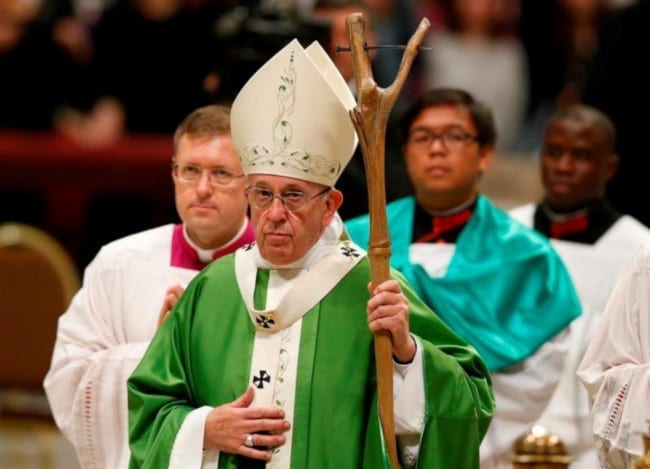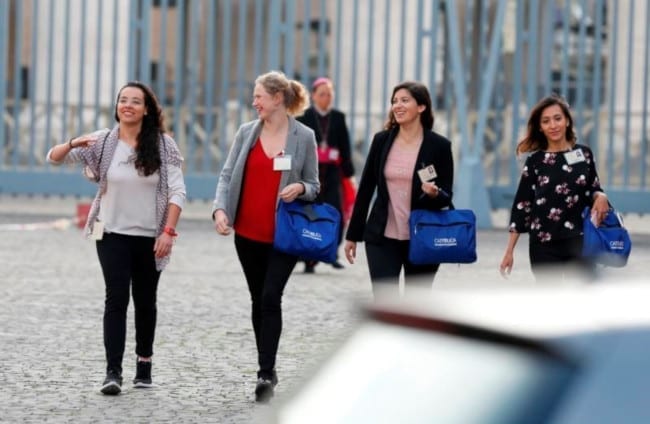November 9, 2018 — Speaking on behalf of all adult Catholics, Pope Francis formally closed the Synod of Bishops on Oct. 28 by asking young people for forgiveness.

Pope Francis celebrated the closing Mass of the Synod of Bishops in St. Peter’s Basilica at the Vatican Oct. 28. (CNS photo/Paul Haring)
“Forgive us if often we have not listened to you; if, instead of opening our hearts, we have filled your ears. As Christ’s church, we want to listen to you with love” because young people’s lives are precious in God’s eyes and “in our eyes, too,” the pope said in his homily.
The Mass, celebrated in St. Peter’s Basilica, closed the month-long synod, which began Oct. 3 and brought together 267 voting members and 72 experts and observers to discuss “young people, the faith and vocational discernment.”
The pope thanked the synod participants for working in communion, with frankness and with the desire to serve God’s people.
“May the Lord bless our steps, so that we can listen to young people, be their neighbors and bear witness before them to Jesus, the joy of our lives,” he said in his homily.
The day before the closing Mass, the pope said that the fruit of the synod is not just a final document for Catholics around the world, but a work of the Spirit that must first “do something in us, it must work in us.”

Pope Francis accepts a letter from Yadira Vieyra, a synod delegate and graduate of Cristo Rey Jesuit High School in Chicago and Georgetown University. (CNS photo/Vatican Media)
“It is the Holy Spirit who gave us this document, for all us including myself, to reflect on what he wants to tell us,” he said.
The final document, released on Oct. 27, focused on improving ways to support young Catholics’ baptismal call to holiness; to welcome the contributions they make to the church; and to help them in their process of growing in faith and in deciding the state of life that would best correspond to what God wants from them.
There was also an emphasis on the church listening to all people — including women — renewing communities and structures for a “synodal church” where all members listen to, support and challenge one another and share responsibility for the church’s one mission of spreading the Gospel.

Synod youth delegates arrive for a session of the Synod of Bishops on Oct. 16. (CNS photo/Paul Haring)
“Listening is an encounter in freedom, which requires humility, patience, willingness to understand and a commitment to working out responses in a new way,” the document said.
The bishops said they heard from many young people a need for “courageous cultural conversion and a change in daily pastoral practice” to promote the equality of women in society and in the church.
“An area of particular importance in this regard is the presence of women in church bodies at all levels, including in leadership roles, and the participation of women in church decision-making processes while respecting the role of the ordained ministry,” the document said. “This is a duty of justice.”
On “vocation,” synod members emphasized how the basic, common Christian vocation is the call to holiness, which can and should be lived out in every state of life: young or old, single or married or in the priesthood or religious life.
“Vocation is neither a script a human being is called to recite, nor a spontaneous theatrical moment leaving no traces,” the document said. God calls each person into a relationship with him, respects the person’s freedom and yet has a plan for each person’s life; discovering that plan requires prayer and self-examination.

Synod observers talk before a session of the Synod of Bishops on Oct. 23. (CNS photo/Paul Haring)
Young people who are poor or experience discrimination — especially migrants, victims of religious persecution and those struggling to find employment — received special attention at the synod and in the final document.
The synod said, “The world of young people is also deeply marked by the experience of vulnerability, disability, illness and pain” and Catholic communities have not always done everything possible to welcome and assist them. [Sources: CNS, CNS, CNS]
